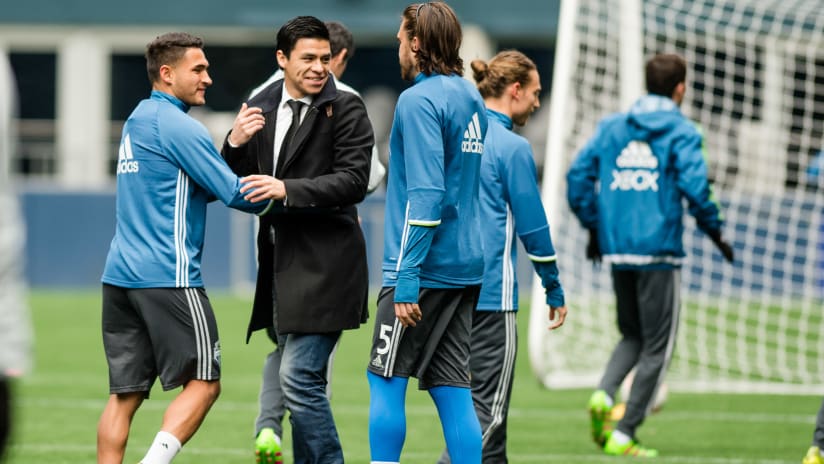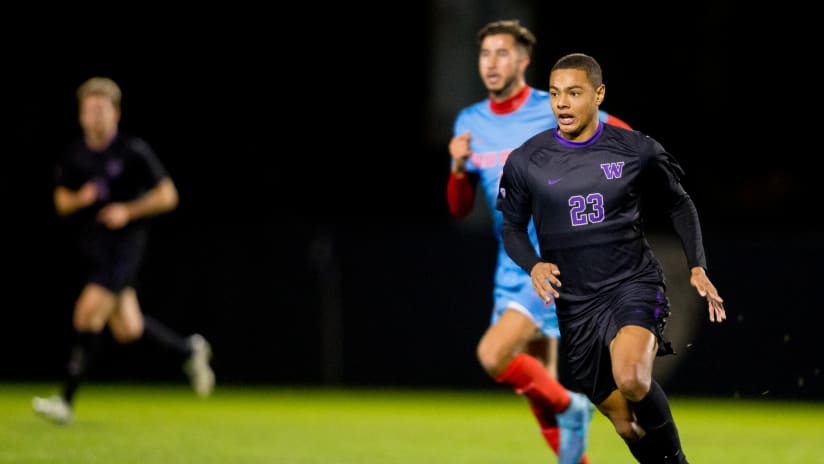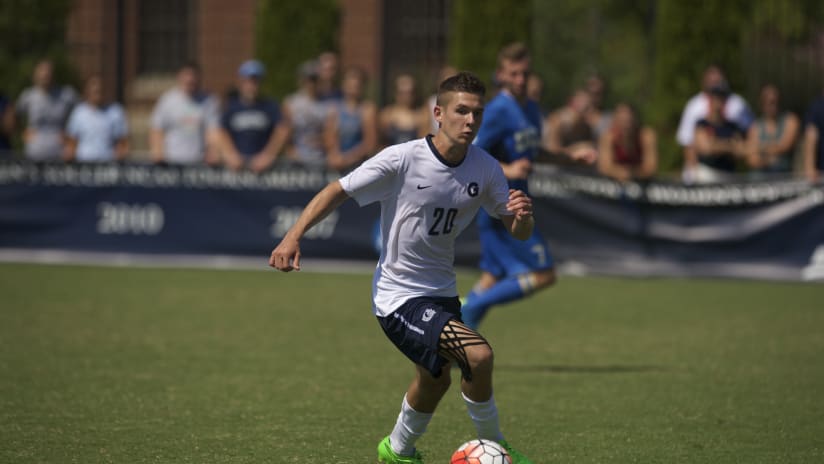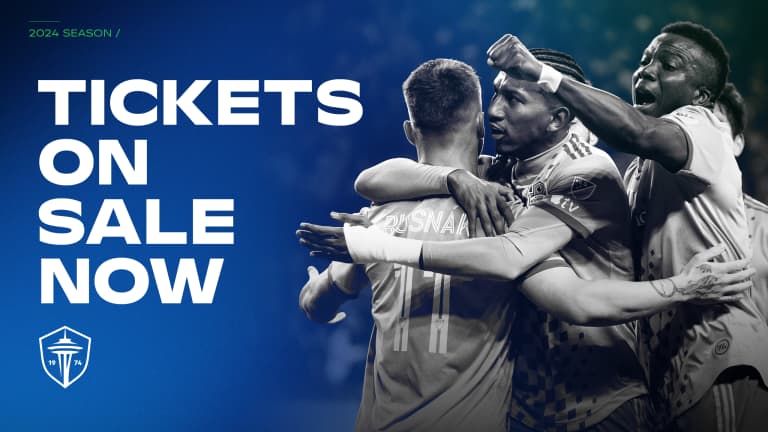
It took a few years, but the Seattle Sounders finally reeled in the biggest catch on their line. Jordan Morris is official.
After spending more than a week on trial with Bundesliga club Werder Bremen, Morris performed well enough to garner a contract offer. He ultimately turned it down in favor of returning to his boyhood club, where he witnessed the first MLS match in franchise history in person in 2009. After three years at Stanford and a dalliance in Europe, Seattle hauled in the big one.
Beyond the scope of the background noise involved with the move, there is soccer to be played. Morris still has to earn his place on a team with ocean-sized talent at forward. The 21-year-old will be learning from Clint Dempsey and Obafemi Martins and Nelson Valdez, but more than that, he’ll attempt to elbow his way onto the field.
And that’s no easy task in this group.
I’ve watched plenty of Morris over the years. I saw him play for the Sounders U-18 side at the Development Academy Showcase in 2013. I watched him play in each of his three seasons with Stanford. And, of course, I was there for his U.S. national team successes, namely his breakout performance and first-ever senior team goal against Mexico last spring.
Morris is bringing a healthy skill set to Seattle, one unique enough to fit into the team’s firmament and have its own space. Here, in a broad nutshell, is what to expect to see from Morris in his first season as a pro.
Strengths
When Morris was on trial in Germany last week, Werder Bremen CEO Thomas Eichin said something curious about his impression of the American youngster’s game.
“He does a few things, you usually rarely see,” Eichin said. “He has his sights set on the goal at all time, does not think about it too much, and he reminds me of my time in ice hockey.”
Hockey, eh?
Eichin could have said it more eloquently, but his general idea is that Morris is a no-nonsense player with a singular mind going forward. The first sign of a young striker tends to be that they dither in front of goal with their chances. Not always, but too frequently. As a forward ages, he tends to become less inhibited and more willing to stick his nose into dangerous positions. It is in those risks that the largest payoffs are found.
Morris has never had that issue. He’s a rampaging bull when he’s switched on, willing to jump on open space and run at defenders one-v-one. He’s not always at his best in those particular situations - that’s something we’ll get to in a moment - but at the very least he’s willing to have a go. With the mentality sorted, all that needs to follow is execution, and that can be coached.
Morris is not a traditional striker, because he’s never had to be. Early in his Stanford career, Morris played a bit as a flank player because his sheer speed was so awe inspiring. Eventually, Stanford coach Jeremy Gunn couldn’t ignore Morris’s natural ability to cash in on opportunities around the net, so he was pushed up top.
Morris will never be a back-to-the-goal player, and that’s OK so long as teams budget for that. So perhaps it’s fortuitous that Seattle’s coaching staff has experience coaching Martins, because in mentality the two aren’t that dissimilar. Morris will drop deeper into the pocket between the lines, mostly listing toward the left, and push forward to dislodge defenders. Historically it has been frightfully effective.
Morris also has a leaden right foot. There were a few notable times at Stanford when Morris produced a thunderbolt of a goal from tight coverage outside the box. As much as he prefers to drive into the box, his sheer leg strength is almost inhuman.
Weaknesses
Morris’s history as a college player has largely been overblown. Morris certainly wasn’t ready for a pro contract out of the Academy at 18, and anyone who watched his progression at Stanford could clearly see him shoring up his game in a tactical sense. How much college helped him is up for debate, but it most certainly did not hurt him.
That said, there are two primary concerns the Sounders coaching staff will need to iron out of his game as a pro, and they involve spatial discipline and on-ball technical skill.
Morris was given unique tactical license to roam at Stanford, which played a more direct style that didn’t require him to do any one thing with consistency. He neither dropped deep into the midfield to collect possession nor tagged onto the defender’s back shoulder with anything approaching game-to-game consistency, which is good and bad. In one sense he’s done everything you ask from a striker, and in another he’s not done anything quite enough.
While Morris is a devil in space, his game begins to break down when he’s in tight spaces. This is where the comparison with Martins falters. Where Martins thrives in those shrunken triangles that produce crowd-pleasing one-twos in and around the area, Morris is almost constantly of a single goal-scoring constitution. He is either looking to score or looking to pass to someone who can score.
This is not a bad thing on its own. A striker is supposed to score. But at the pro level, and especially in head coach Sigi Schmid’s system, passing through a bunkered defense is often part of the game plan. Watch Dempsey and Martins interchange last year and you’ll see two thoroughly technical strikers obliterating center backs with preternatural vision. Morris is young yet, but he hasn’t quite displayed that ability yet.
There’s also the issue of his left foot.
Morris’s right foot is so lethal that you can almost forget that he’s never looked all that comfortable with his left. Even during his trial with Bremen, his one assist that got so much attention came from the left flank with the outside of his right foot. And that’s no aberration. He does that a lot.
It’s important to note that the cross was on the money and led to a goal. There’s no question he uses it effectively. But when that’s your most comfortable mode of playing in a ball from the left, it can be problematic on a professional level when your space and time are more limited. Upping Morris’s comfort with his left foot and his ability to be more spatially disciplined will undoubtedly be two training ground pushes this spring.
Intangibles
The Sounders have done a lot (and spent a lot) in the transfer window since the summer of 2015. There was a new Designated Player signing in Nelson Valdez, a high-profile center back in Román Torres, a new wide option in Andreas Ivanschitz, midfield depth from Erik Friberg. All of those signings contributed to the whole, and each has a place in 2016.
But it’s hard to understate how big of a signing Morris is, especially based on the anticipation that’s built over the last few years.
There is an argument to be made that there has not been a more important initiative in MLS history than the Homegrown rule, which incentivizes the developing and signing of a team’s own players. While foreign transfers have their place, it is ultimately through this model that American soccer will step into a new dawn. And Morris is not just the biggest Homegrown signing in Sounders history. He is the biggest in MLS history.
If the Homegrown rule didn’t exist, Morris would’ve been an important signing for any team. So the fact that the Sounders had him in their back yard, had his allegiance and could offer him a significant chunk of change through the Homegrown allocation rule set? A windfall if ever there was one.
Morris will immediately become a fan favorite, not just because he’s a local kid who turned down Europe, or because he makes one of the oldest rosters in MLS that much younger, but because he can help Seattle from day one.
The second he steps into the stadium he’s already a fan favorite, and that in itself is worth its weight in gold.








